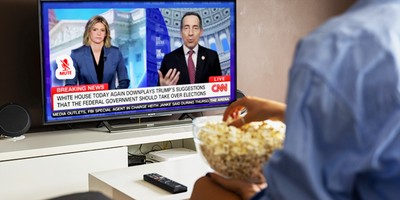Monday was the anniversary of the 1995 Oklahoma City bombing that left 149 men and women -- most of them federal workers -- and 19 children dead. As is his habit, former President Bill Clinton used the occasion to bash his critics.
In a New York Times opinion piece, "What We Learned in Oklahoma City," Clinton placed the blame on Americans who have advocated smaller government. The terrorists -- bomber Timothy McVeigh and his accomplices -- who targeted the Murrah Federal Building, he wrote, "took to the ultimate extreme an idea advocated in the months and years before the bombing by an increasingly vocal minority: the belief that the greatest threat to American freedom is our government, and that public servants do not protect our freedoms, but abuse them."
When a former president seizes such a tragedy for partisan purposes, it is no wonder a new Pew Research poll found that a modest 22 percent of voters say they trust Washington to do the right thing most of the time.

Clinton wrote that while criticism is "part of the lifeblood of democracy ... we should remember that there is a big difference between criticizing a policy or a politician and demonizing the government that guarantees our freedom and public servants who enforce our laws."
What I want to know is: Other than the twisted McVeigh and company, who is not clear on this difference? Does Clinton think his all his critics are stupid, or is he playing stupid?
Recommended
But wait, there's more. Clinton continued, "We must all assume responsibility for our words and actions before they enter a vast echo chamber and reach those both serious and delirious, connected and unhinged."
Think about that for a minute: If anyone were to cast blame for the Fort Hood shootings that left 13 dead, or any other attacks within American military bases, on the antiwar movement, then that assertion would be followed by howls of outrage, and deservedly so. It would be absurd to suggest that opposition to the war be misconstrued as promoting violence against U.S. troops.
Yet somehow arguing against President Obama's health care plan can be construed as practically an incitement to violence.
And it doesn't matter if you blamed cult leader David Koresh -- not federal agents -- for the violence that claimed more than 80 lives in Waco in 1993. Or that you urged the death penalty as the only fitting punishment for McVeigh. Somehow if you oppose the expansion of the federal government, you are responsible for the violence that you abhor.
The Council on American-Islamic Relations echoed Clinton in a press news release commemorating the Oklahoma City deaths that berated "experts," who initially blamed Muslim extremists for the bombing, then cited the need to "recognize that the same anti-government extremism that led to the attack is growing and is unfortunately moving toward the mainstream."
The press news release then went on to denounce "stereotyping." Really.
So what did Clinton learn from Oklahoma City? He learned that he could drive the wedge that divides the electorate even deeper -- and in so doing, endear himself to the element of his party smitten with itself. But outside the Clinton echo chamber, it sounds like whimpering.

























Join the conversation as a VIP Member